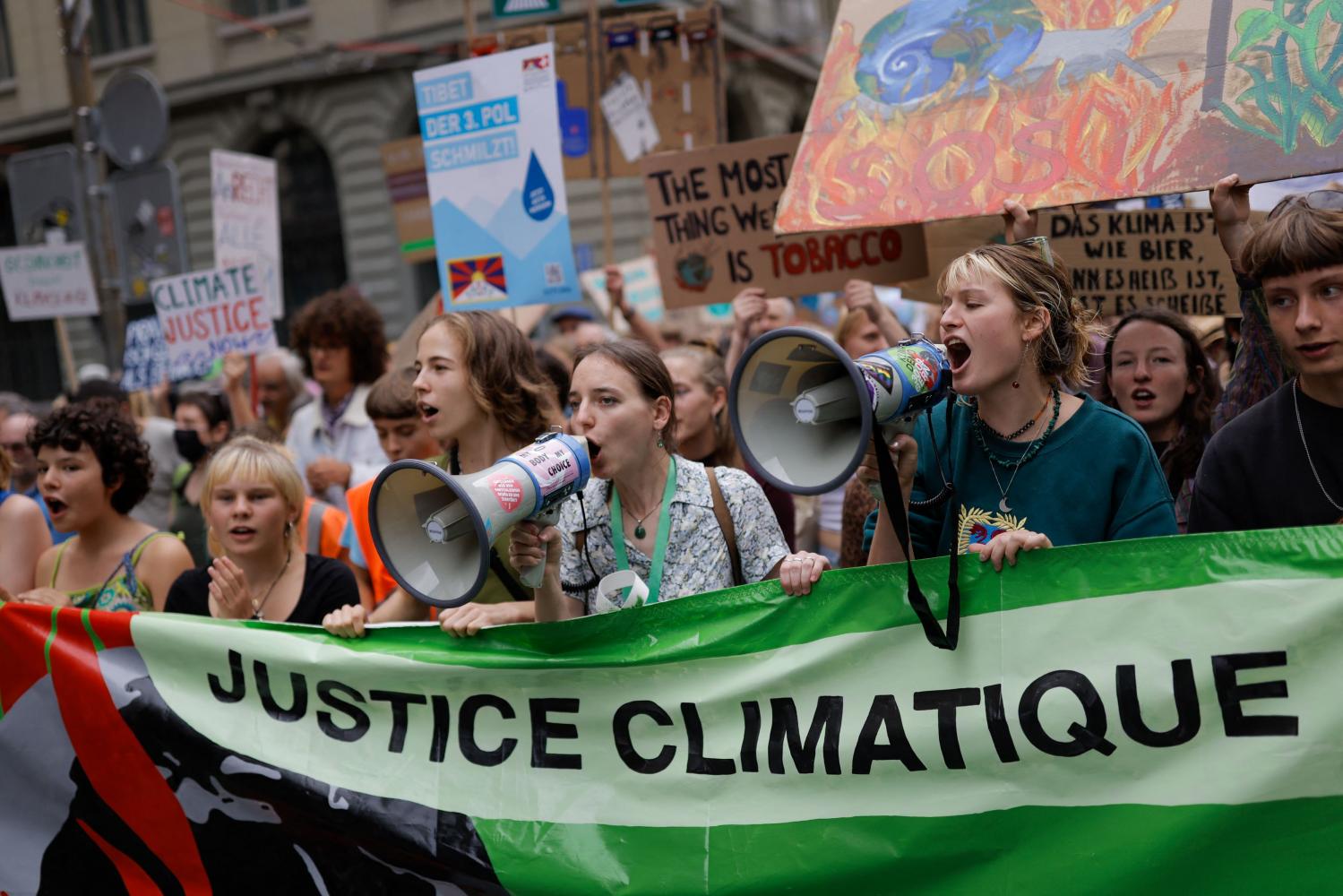
It doesn't get more David versus Goliath than the latest case to be heard before the Grand Chamber at the European Court of Human Rights. Six youngsters from Portugal, represented by a small crowdfunded legal team, charged 32 countries and their 86-strong team of lawyers with climate crimes last week. It's part of a wave of judicial mobilisation seeking to ensure climate agreements aren't just words on paper.
The claimants, aged between 11 and 24, accuse the nations -- including all 27 European Union member states, along with the UK, Norway, Turkey, Switzerland and Russia -- of failing to do enough to combat the climate crisis and thus threatening their right to live a safe, happy and healthy life. Specifically, they argue that extreme heat and wildfire risks force them to stay inside, make sleep and exercise difficult and trigger mental distress.
A ruling from the courts is expected in the first half of 2024. And the decision isn't just symbolic: The judges may resolve on a legally binding order for the accused countries to act faster on climate change.
Indeed, the Portuguese youth case is just one of three climate-related lawsuits that the ECHR has heard this year amid a rise in such litigation around the world. It's a trend I'm cheering on in the hope that a few key cases could help advance action and accountability on slashing carbon emissions.
Sovereign nations are typically in the firing line: Outside of the US, 70% of climate-related cases are against governments. But strategic cases -- those filed with the aim of influencing the broader debate -- are increasingly being brought against the private sector, too. Even as we wait for definitive verdicts, the attention they're attracting and the precedents they could set have the potential to influence corporate behaviour and governance in a big way.
One of the most famous ongoing trials is one brought by Saul Luciano Lliuya, a Peruvian farmer who's suing German energy company RWE AG for the costs of preventing a lake from flooding his hometown. The size of the lake has quadrupled since 2003 as glaciers in the region melt. These cases are the most difficult to bring to trial, as it's hard to prove the culpability of the accused for the damages in question. But advancing scientific knowledge is changing things. According to the Carbon Majors Database, RWE is responsible for 0.47% of global carbon emissions, so Mr Lliuya is suing for that proportion of the cost of flood-prevention measures. That's not much money -- the proportional cost of the damages would be less than US$20,000 (742,200 baht) -- but it would set a monumental precedent and lay the groundwork for future cases against polluters.
Other strategies involve challenging corporate climate plans, attempts to stop the financing of high-emitting activities or tackling greenwashing concerns. Environmental lawyers are also getting creative: ClientEarth, an NGO specialising in climate litigation, bought shares in Polish energy company Enea SA and then sued it successfully for failing to manage material climate financial risk and act in the best interests of its shareholders.
The demand is there, and the money is available: Pogust Goodhead, a class-action law firm, and Gramercy, a US hedge fund, recently announced one of the largest-ever litigation-financing deals. The £450 million (20.1 billion baht) funding will help victim groups hold corporations to account. The law firm is currently representing more than 700,000 victims of the Mariana dam collapse in Brazil against BHP Group Ltd and Vale SA, as well as taking on 14 car manufacturers over the Dieselgate scandal.
This use of strategic litigation is not unique to the climate crisis, Joana Setzer, assistant professorial research fellow at the London School of Economics and Political Science's Grantham Research Institute, told me. On social issues, including racial discrimination and women's rights, legal challenges have been an important way to raise awareness and change the status quo. Even if court rulings aren't favourable to the litigants, there's a win from raising awareness and laying the groundwork for future campaigns.
So is it having an impact? Cases against government are setting important precedents: Urgenda Foundation v Netherlands, for example, found that the Dutch government has obligations to urgently and significantly reduce emissions in line with human rights obligations. The December 2019 decision from the Netherlands' Supreme Court led to a flurry of similar actions around the world. The recent case of Held v Montana in the US may only be a fairly narrow decision, based on a line in the constitution that is only found in a handful of states, but it offers some lessons and standing for future American cases that may also seek to enlist the constitution as an ally.
On the corporate front, we're still awaiting the outcomes of key lawsuits that could totally change the status quo. However, these cases may already be influencing corporate behaviour. Getting sued is a huge financial and reputational risk for companies, after all. With climate litigation a firm reality, they are having to take sustainability concerns more seriously.
Thanks to some litigious climate activists, more businesses may realise that the best thing for them and for the planet is to cut emissions deeply and swiftly. Co-opting judges in the battle to curb carbon emissions is a smart strategy. ©2023 Bloomberg
Lara Williams is a Bloomberg Opinion columnist covering climate change.